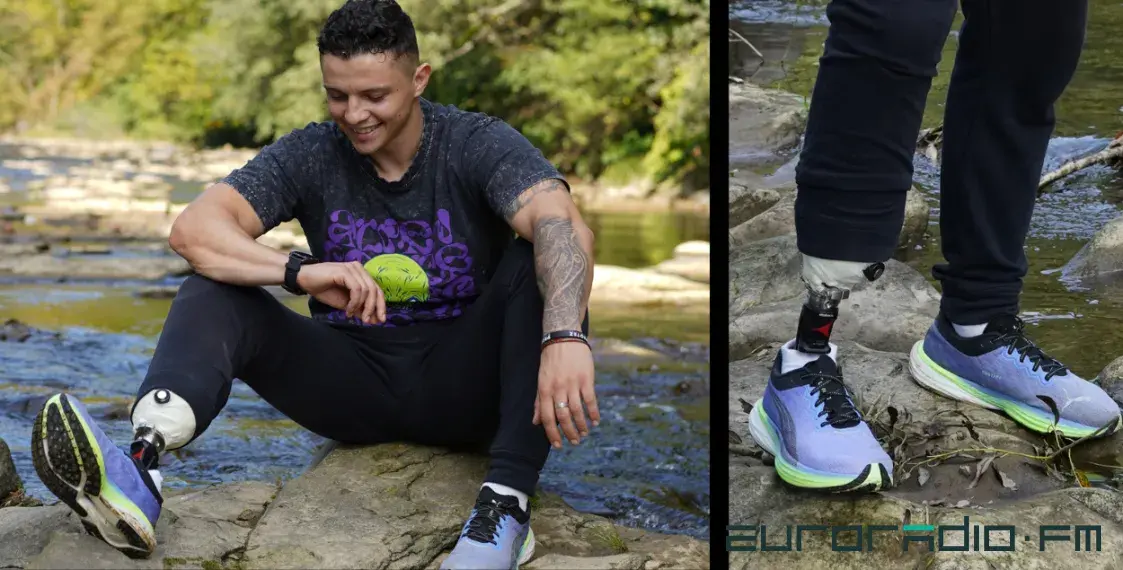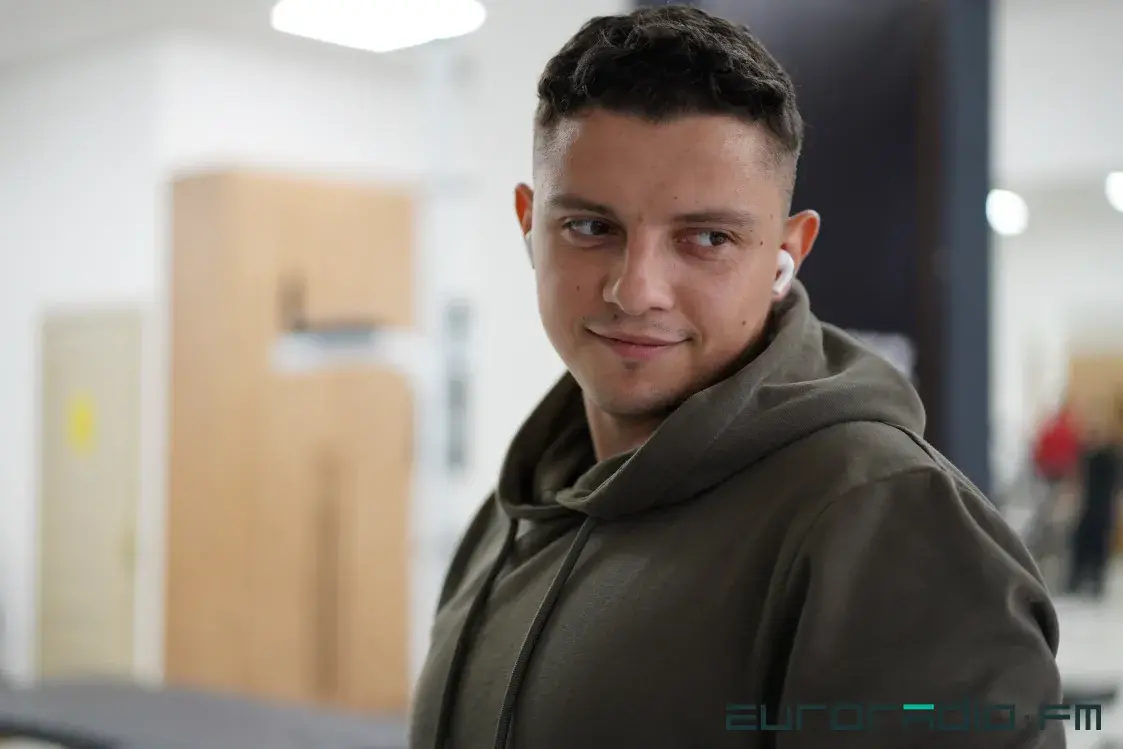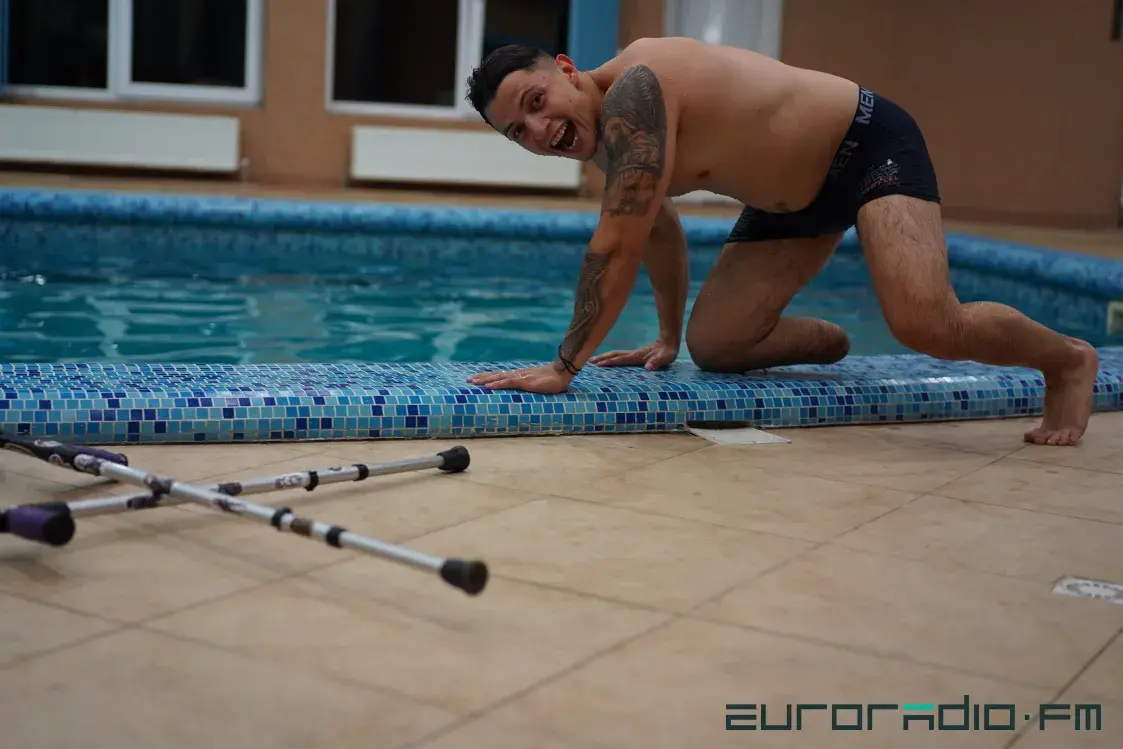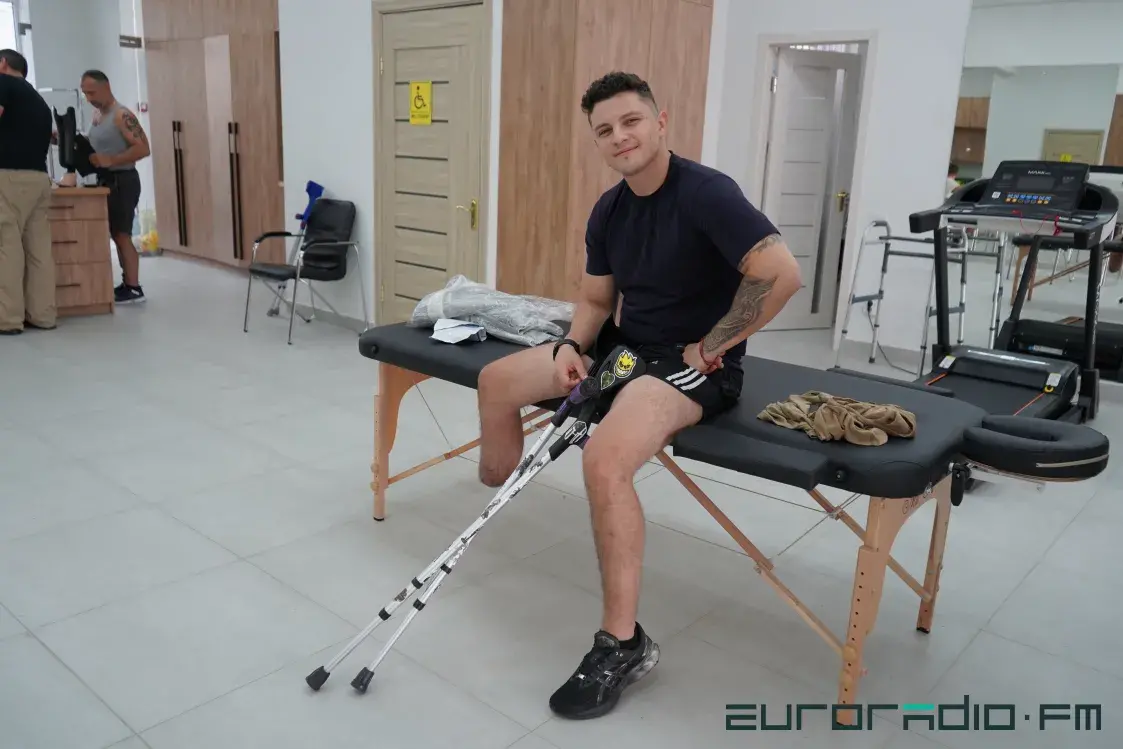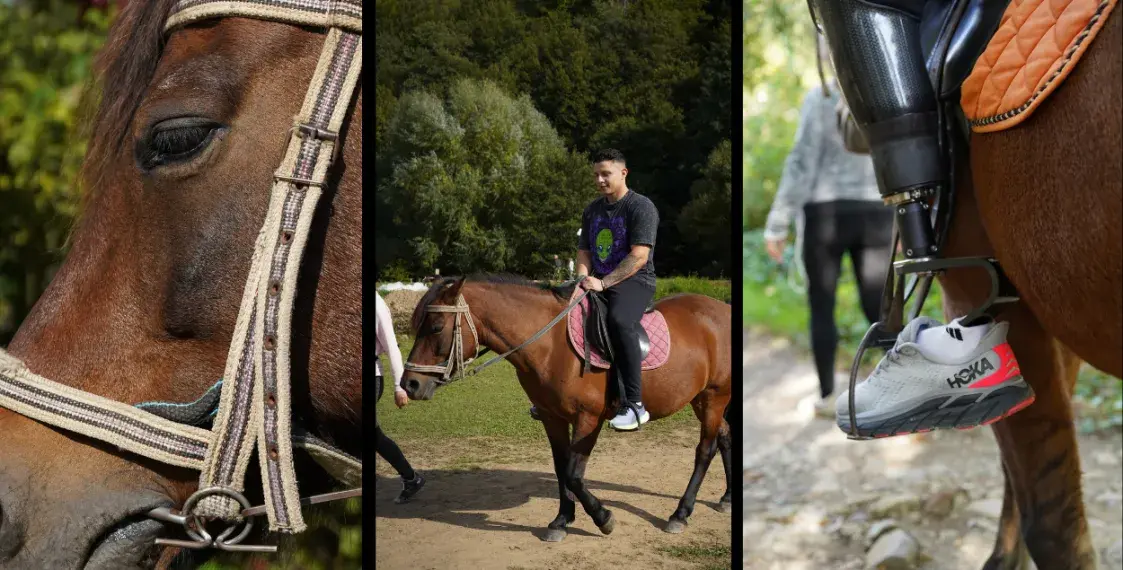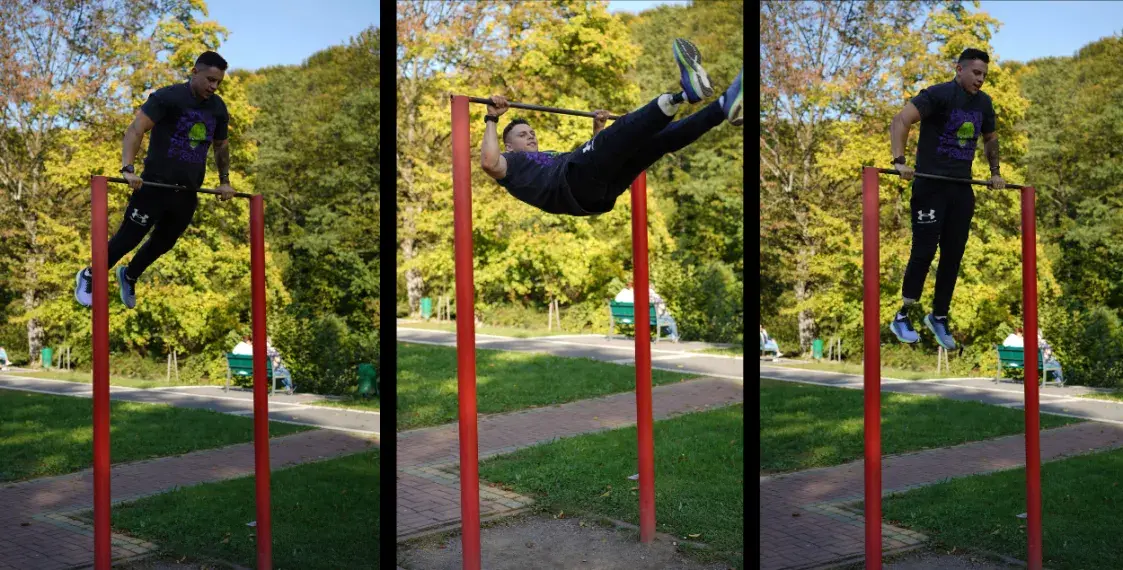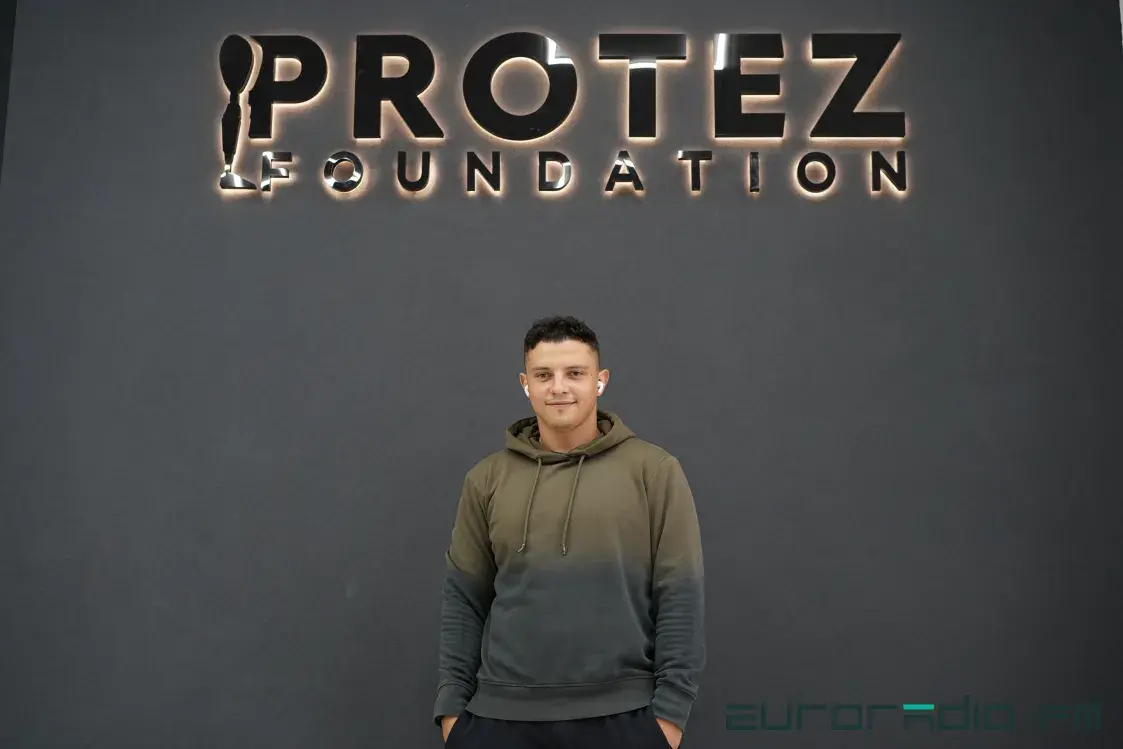Ukraine army officer survives amputation and can walk again

Oleksandr Mikhov / Euroradio / Euroradio / Euroradio
"After the explosion, all you can hear is ringing in your ears. And when you come to your senses, you try to understand what you have and what you don't have. And you realize that something is gone".
Sasha and I are having tea. Sasha is a major in the AFU. He is 29 years old. On the way to the cafe, Sasha limped a little. He says he fell last night in his hotel room: he got out of bed and forgot that he had no leg.
The cafe is in a small town in Transcarpathia. A few steps away is the Protez Foundation rehabilitation center. This is where Sasha was fitted with a prosthetic leg. Over the next month, he will learn to walk and live with it.
The beginning. "Zhenya shouldn't have died for nothing, you know?"
Sasha doesn't hide his foot on purpose - a metal ankle protrudes from his sneaker. He doesn't mind people asking about the prosthesis - in fact, he wishes they would ask more often. "Well, there's a 99 percent chance it's an injury, not diabetes".
In 2022, after 10 years in the Army, Sasha was due to retire. He didn't know what he would do in civilian life. He knew he loved people and photography, and he wanted to figure out how to use that knowledge about himself in civilian life. But the war began.
The first victim in Sasha's life was his friend Zhenya. A shrapnel went in near his eye and hit him in the brain. After the battle, from which Zhenya did not return, his comrades were given the opportunity to leave the unit for another part, where the service is easier.
"They gathered us and told us: "Guys, you know where you are and what will happen later. If you're not morally prepared, don't get in the way, don't hold the group back, don't be a burden".
Sasha has two children, and he knew his wife would convince him to use this opportunity.
"What did she say? Honestly, I don't remember. She wanted me to come back and stay close and not to take any risks".
"What did you say?"
"Well, I realized that if the professional military that trained for this didn't stay, the faggots would come to my house. And I also thought... I thought that Zhenya shouldn't have died for nothing, you know?"
Fighting. "When we reached the shelter and sat down to rest, he just threw up from the stress"
Sasha was the commander of the Corsair (Ukrainian anti-tank missile system). He says that he walked many kilometers through the "gray zone" - that part of the frontline territory where no one knows for sure if the enemy is there. And for a few kilometers he went into the "red zone": this is the part of the territory where it is known for sure that the enemy is there.
"You walk very slowly through this forest, looking for an ambush. You walk knowing that every step you take could be your last.
I almost always walked second and the engineer walked first. When we reached a shelter after 10-15 kilometers in the "gray zone" and sat down to rest, he just threw up from stress. Because going first is very hard.
When the engineer was away, I often went first.
You're focused: on the bushes, on what's under your feet, on every rustle. You have to fire the first shot - and not at yourself. All your senses are heightened. The adrenaline rushes, but you have to hold it back so you don't get hit.
There have been situations where you know 100 percent: there, ahead, death. And the instinct of self-preservation tells you, "Are you crazy? Don't go! But there are times when that instinct has to be turned off. Your body says: No, no, no, no, don't go! And you realize that if you don't, your chances of getting killed only increase".
The day Sasha was wounded, he was walking second. The path was booby-trapped. Twenty-two PMN-2 anti-personnel mines had been put on it. After one exploded under Sasha's foot, the boys found twenty-one more.
"We were very lucky that they put them on our path instead of making a "mine bag"...
"What's that?"
Sasha spreads out napkins in the shape of the letter "P" on the table. The napkins are mines, you can't step on them.
"It's like a hallway. You walk in a group, and then the first or second person steps on a mine. He falls, about a meter away from the explosion. The other guys hear the explosion and move to trees, to shelter - it's instinct. And if more mines are placed near such shelters, the others will explode after me".
Sasha removes the "mine bag" from the table and moves a cup in its place. At a neighboring table, people are listening to his story. Sasha doesn't notice, but he doesn't mind -- he likes it when people listen to his story. He recently started sharing his experiences on Instagram. In the photos, he's almost always smiling, riding an exercise bike, pumping abs, or hiking in the mountains.
Sasha tells us what happened a few months before these photos were taken. Rain, fog. The terrain is uneven. He was evacuated by seven of his brothers in arms.
"At first I wanted to talk, I joked with the boys. But after a while I couldn't joke anymore".
The pain. "When it starts to hurt, you call the nurse again and she injects the drugs again"
"At the moment of the explosion? On a scale of one to ten, it's a 5. And then the pain goes up to an 11.
But at the stabilization station, they give you a narcotic analgesic. It gets easier or even better.
"It starts hurting again, you call the nurse again, and she injects you with the narcotic again. You roll your eyes, nothing hurts anymore".
And then you go to the hospital where they give you the usual painkillers. But you don't feel it anymore. It doesn't affect you. They give you more, more, more. They're looking for something to make you feel better. And nothing does, and you're in pain all the time.
It's always been painful. "It hurts excruciatingly," "It hurts like hell," or "I couldn't stand the pain anymore."
There was a call button above the bed.
"When the pain became unbearable, I would push the button and the nurse would give me a shot. First she'd give me a mild anesthetic so I could sleep. Then the anesthesiologist put a catheter in my spinal cord so that my right side [Sasha lost his right leg. - Euroradio] became numb. He said that this anesthesia should last for eight hours, but I had enough for an hour and a half at the most. He came once, then he came again. And the third time he said, "I can't give you any more". But you already hurt like hell. So what do I do?
I pushed the button again, called the nurse again.
You know what really sucks? It takes you a while to realize that you're going to have to get out of there. At some point I thought I was either going to become a junkie or I was going to have to get out.
Sasha began to gradually reduce the dosage of "drugs" until he reached the usual painkillers. Then he spent a long time on pregabalin, a drug that helps with phantom pain.
"It makes you feel a little drunk all the time," Sasha explains. He has a video on his phone of him "a little drunk" on pregabalin. "Now I don't take anything but vitamins. Thank God. Let's go out for a smoke".
We are smoking.
"There are a lot of things that nobody knows. Doctors don't know, people you care about don't know. And the injured guy would not always tell you about it either. Take a shower for example!" Sasha suddenly says.
"A shower?"
"Shall I tell you how I took my first shower after my injury? You're on crutches. There's a rail in the shower. You need someone to be with you at all times because on crutches you can slip and fall. You hold on to the railing with one hand and you sit on a special chair and you shower sitting down because you can't get up.
I was in shock - it's so hard just to go to the shower! And that's even though I'm far from having the most serious injury. So yeah, there are a lot of things that people don't know - and won't know unless they ask".
Mom. She pulls herself together and says, "Yeah, yeah, it's okay. Everything is fine"
Across the street from the Kyiv train station is a McDonald's. Sasha sat outside with a cup of coffee, his crutches next to him. He was waiting for his mother. She was coming on the train from Odesa. It had been two and a half months since he had been wounded. Mom still didn't know what had happened.
"I told my mother that I was wounded only after it had healed. When she was on her way to visit me in Kyiv, I told her I was wounded. When she was on her way, I told her that the injury was serious.
And here I am sitting on the street with coffee. She sees me. She sees the injury. And I can see that she's already crying. I tell her, "Mom, please, let's not do this. And she pulls herself together and she says, "Yeah, yeah, it's okay. And she did the best she could with her tears".
Sasha's mom has never seen him without crutches and with a prosthesis. Now, thousands of miles away from home, he is learning to walk again.
"Feelings? It's like you didn't stand on your foot, you took off. You didn't appreciate walking on two legs before. What's there to appreciate? And when you're on the other foot after an injury... You can't express it".
With a prosthesis, Sasha has already gone to the mountains, ridden on horseback and... walked on the curb.
"I understand mountains and horses. But what's so hard about the curb?"
"You're basically just holding on to a stump - you have no foot, no toes. And without all that, you have to keep your balance. But you adapt. In the beginning I could only stand on one (injured) foot for two seconds. Now it's fifteen seconds".
Sasha will be completely satisfied with himself when he climbs Hoverla with his prosthesis - it is the highest point in Ukraine.
"I am thinking about Everest. That would be a blast".
I ask Sasha what makes him happy. He shows me the comments on his recent Instagram posts. In the comments, everyone says Sasha is cool. That's what makes me happy.
"I've had a lot of people help me. Both financially and morally. A classmate I haven't seen since high school started a fundraiser for me. But there are days when there's no one. Days when you really feel like no one needs you anymore. I was lucky - I didn't have many days like that.
A lot of things changed in me after I was wounded. A lot of things. I started to appreciate myself, to appreciate every detail, every little thing in my life. I realized that if you don't love and appreciate your life, life won't appreciate you".
Sasha will not return to the war. He wants to take up photography seriously and tell the stories of wounded Ukrainian soldiers. He wants to change the urban space for them - he wants a wheelchair in every city, so that he can easily get to the curb. So that more people will pay attention to the wounded on the street. Sasha teaches us: "It's nice for a person if you nod in respect or put your hand over your heart".
"But earlier, when I was on leave, I realized that I wanted to go back to the battlefield as soon as possible. Because it turns out that when you're in combat, you don't really want to see how people live and behave. That's why so many military people come back to fight, even after being injured".
"What's wrong with that? What are people talking about?"
"Oh, just little things. iPhones, material things. They're chasing them. And that's when you start to realize what real values are. Real friends. You realize that these guys can pull you out of any situation. And you're going to get them out.
It's hard out there without the real thing.
Sasha winces slightly.
"Does the leg hurt?"
"It will always hurt now," he says. "By the way, you know what else makes me happy? I'm happy that my children will know that I'm a really cool dude.
Protez foundation — is a platform that provides prosthetics and rehabilitation for people who lost limbs in the war in Ukraine. As part of this program, Sasha will receive three prosthetics - for everyday use, for running and for swimming. The foundation was founded by Ukrainian prosthetics doctor Yakov Gradinar and businessman Yuri Aroshidze.
From May 2022 to September 2023, 120 people participated in the program of the Protez Foundation. They received 340 prostheses. You can donate from Ukraine. If you are in the European Union or the USA and would like to help the Ukrainian military get back on its feet as soon as possible - write to our editors at info@euroradio.fm.
Made with the support of Mediaset
